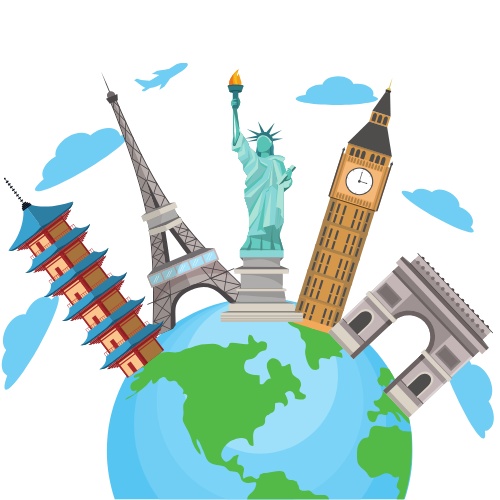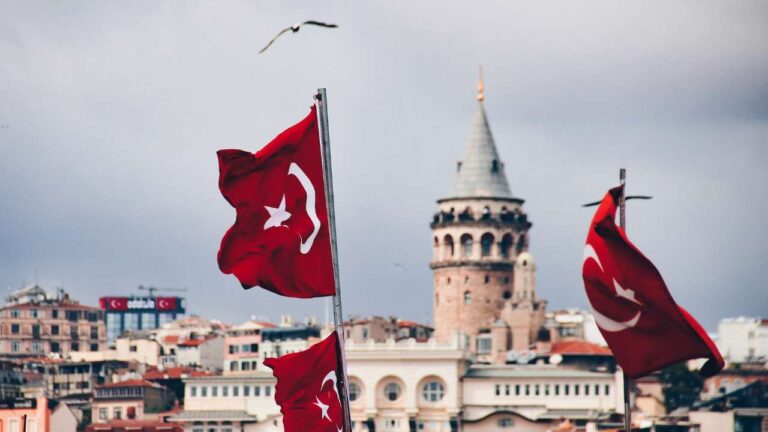Turkey, a country where East meets West, offers a captivating mix of history, culture, stunning landscapes, and vibrant cities. From the ancient ruins of Ephesus to the bustling bazaars of Istanbul and the breathtaking landscapes of Cappadocia, Turkey is a traveler’s dream. Whether you’re a history buff, nature lover, or beach enthusiast, this trip planner will guide you through everything you need to know for an unforgettable Turkish adventure.
Table of Contents:
- Introduction: Why Visit Turkey?
- When to Visit Turkey
- Getting to Turkey and Getting Around
- Top Destinations in Turkey
- Istanbul
- Cappadocia
- Ephesus
- Pamukkale
- Antalya
- Bodrum
- Fethiye and the Turquoise Coast
- Mount Ararat
- Gallipoli
- Suggested Itineraries
- 1-Week Highlights of Turkey
- 2-Week Turkey Explorer
- Budgeting for Your Trip
- Accommodation Costs
- Food and Drink
- Transportation
- Sightseeing and Activities
- What to Pack for Turkey
- Essential Travel Tips for Turkey
- Conclusion
Introduction: Why Visit Turkey?
Turkey is a destination that offers something for every kind of traveler. Its vibrant cities, such as Istanbul, are rich in history and modern culture, while its natural landscapes, like the fairy chimneys of Cappadocia, leave visitors in awe. Whether you’re interested in the ancient wonders of Ephesus, the relaxing beaches of Antalya, or the dramatic cliffs of Pamukkale, Turkey has it all.
A trip to Turkey is not just a vacation—it’s a journey through time and culture. With its warm hospitality, diverse cuisine, and stunning architectural marvels, Turkey stands as one of the most visited countries in the world, attracting over 45 million tourists annually (pre-pandemic levels).
When to Visit Turkey
The best time to visit Turkey largely depends on the type of experiences you want. However, spring (April to June) and autumn (September to November) are often considered the best seasons, as the weather is mild, and tourist crowds are smaller.
- Spring (April to June): This is the ideal time for city sightseeing, exploring historical sites, and walking tours.
- Summer (July to August): Great for beach lovers heading to the Turkish Riviera, but expect high temperatures and tourist crowds.
- Autumn (September to November): Perfect for exploring both cities and natural landscapes, with moderate weather and fewer tourists.
- Winter (December to March): Best for travelers interested in skiing in the mountains or experiencing Istanbul’s less crowded attractions.
Getting to Turkey and Getting Around
Getting to Turkey
Turkey has several major international airports, with Istanbul being the main hub for international flights. Other cities with international airports include Ankara, Izmir, and Antalya. Turkish Airlines and many international carriers operate direct flights from Europe, the Middle East, Asia, and North America.
Getting Around Turkey
- Domestic Flights: Turkey is a large country, and domestic flights are an efficient way to travel between cities. Turkish Airlines and Pegasus Airlines are the two major carriers.
- Trains: Turkey has an extensive train network that connects major cities. The high-speed trains between Istanbul, Ankara, and Konya are particularly useful.
- Buses: Intercity buses are affordable and well-maintained. They offer comfortable services between major towns and cities.
- Car Rental: For those looking to explore rural Turkey or drive along the coast, renting a car is a great option.
Top Destinations in Turkey
1. Istanbul
Why Visit: A city that straddles two continents, Istanbul is a fascinating blend of ancient history and modern cosmopolitan life. From the iconic Hagia Sophia and Blue Mosque to the bustling Grand Bazaar and Bosphorus Strait, Istanbul is the heart of Turkey.
Must-See Attractions:
- Hagia Sophia
- Blue Mosque
- Topkapi Palace
- Grand Bazaar
- Bosphorus Cruise
- Galata Tower
- Basilica Cistern
2. Cappadocia
Why Visit: Famous for its unique landscape of fairy chimneys and cave dwellings, Cappadocia is a magical destination. The region offers hot air balloon rides, underground cities, and hiking through stunning valleys.
Must-See Attractions:
- Hot Air Balloon Ride over Göreme
- Derinkuyu Underground City
- Hiking in the Ihlara Valley
- Uchisar Castle
- Fairy Chimneys of Pasabag
3. Ephesus
Why Visit: Ephesus is one of the best-preserved ancient cities in the world. This UNESCO World Heritage Site was once a thriving city of the Roman Empire and is home to the famous Temple of Artemis.
Must-See Attractions:
- Library of Celsus
- The Great Theatre
- Temple of Artemis
- House of the Virgin Mary
- Ephesus Museum
4. Pamukkale
Why Visit: Pamukkale, or “Cotton Castle,” is known for its white travertine terraces and thermal pools. Visitors come here to bathe in the mineral-rich waters and visit the ancient ruins of Hierapolis.
Must-See Attractions:
- Thermal Pools of Pamukkale
- Ancient City of Hierapolis
- Cleopatra’s Pool
- Pamukkale Natural Park
5. Antalya
Why Visit: Antalya is the gateway to the Turkish Riviera. It offers stunning beaches, historic old towns, and easy access to nearby archaeological sites.
Must-See Attractions:
- Old Town (Kaleiçi)
- Hadrian’s Gate
- Duden Waterfalls
- Konyaaltı Beach
- Perge Ancient City
6. Bodrum
Why Visit: Known for its vibrant nightlife and stunning coastline, Bodrum is a favorite destination for beach lovers and partygoers alike. It’s also rich in history, with the famous Bodrum Castle and ancient ruins nearby.
Must-See Attractions:
- Bodrum Castle
- Museum of Underwater Archaeology
- Bodrum Marina
- Mausoleum at Halicarnassus
7. Fethiye and the Turquoise Coast
Why Visit: Fethiye is the starting point for exploring the Turquoise Coast. With its stunning beaches, crystal-clear waters, and ancient Lycian tombs, Fethiye is perfect for adventure lovers.
Must-See Attractions:
- Oludeniz Beach
- Butterfly Valley
- Lycian Way Trek
- Kayaköy Ghost Town
- Saklikent Gorge
8. Mount Ararat
Why Visit: For adventure enthusiasts, a trek to the summit of Mount Ararat, the highest peak in Turkey, is a once-in-a-lifetime experience. The mountain is also rumored to be the resting place of Noah’s Ark.
Must-See Attractions:
- Mount Ararat Trekking
- Noah’s Ark National Park
- Ishak Pasha Palace
9. Gallipoli
Why Visit: Gallipoli is a poignant historical site, where one of the most significant battles of World War I took place. Visitors can tour the battlefields, cemeteries, and memorials dedicated to the soldiers who fought there.
Must-See Attractions:
- Anzac Cove
- Lone Pine Cemetery
- Gallipoli Peninsula Historical National Park
- Chunuk Bair
Suggested Itineraries
1-Week Highlights of Turkey
- Day 1-2: Istanbul
- Day 3-4: Cappadocia
- Day 5: Pamukkale
- Day 6: Ephesus
- Day 7: Antalya
2-Week Turkey Explorer
- Day 1-3: Istanbul
- Day 4-6: Cappadocia
- Day 7-8: Pamukkale
- Day 9-10: Ephesus
- Day 11: Bodrum
- Day 12: Fethiye
- Day 13: Antalya
- Day 14: Return to Istanbul
Budgeting for Your Trip
Accommodation Costs:
- Budget hotels/hostels: $20-50 per night
- Mid-range hotels: $50-100 per night
- Luxury hotels: $150+ per night
Food and Drink:
- Street food (e.g., kebabs): $3-5
- Mid-range restaurant meal: $10-20
- High-end restaurant: $40+
Transportation:
- Domestic flights: $30-100 (one way)
- Intercity buses: $10-30 (depending on distance)
- Train travel: $15-40 (depending on distance)
Sightseeing and Activities:
- Museum/landmark entry fees: $5-15
- Hot air balloon ride in Cappadocia: $150-250
- Guided tours: $30-100 (depending on length and destination)
What to Pack for Turkey
- Comfortable walking shoes
- Light, breathable clothing for summer
- Layers for cooler evenings and mountain areas
- Sunscreen and sunglasses
- Modest clothing for visiting mosques
- Swimwear for the coast
Essential Travel Tips for Turkey
- Visas: Many nationalities need to apply for an e-visa before traveling to Turkey.
- Currency: The Turkish Lira (TRY) is the local currency. Credit cards are widely accepted, but cash is useful for smaller establishments.
- Language: Turkish is the official language, though English is commonly spoken in tourist areas.
- Tipping: Tipping is customary in Turkey. Leave around 10-15% at restaurants and tip taxi drivers by rounding up the fare.

